
Local residents describe the perpetrators of these crimes—who have received lavish U.S. funding—as “shameless,” “scumbags” and “terrorists.”
Heroic rescue workers in Donbas should be accorded rights under international law to help people without being targeted
In the more than eight years of bombing the civilians of the Donetsk and Luhansk People’s Republics, Ukraine has committed untold numbers of war crimes. These include bombing residential areas, markets, hospitals, schools, parks—including with prohibited heavy weapons and banned cluster munitions—and, since late July, raining banned “Petal” mines down on populated civilian areas, including the very center of Donetsk, including as recently as September 7.
A lesser-known war crime is Ukraine’s routine targeting of ambulances, fire trucks, medics and rescuers, and their headquarters and stations. Many of the times Ukraine bombs such heroic rescuers, it is when they are on the way, or already on site, to help civilians often themselves just bombed by Ukraine.
On August 21, Ukrainian shelling of the DPR’s Gorlovka wounded twelve, including five firefighters.
The day prior, Ukrainian shelling targeted an ambulance station in the LPR’s Lysychansk, wounding several and damaging some of the ambulances.
On June 23, the Kievskiy District of Donetsk came under repeated shelling over the course of the two hours I was visiting the Emergency Services headquarters there. On the grounds, I saw the remnants of a “Hurricane” missile from a previous Ukrainian attack.
The previous day, Ukrainian forces targeted an Emergency Services fire truck on call, leaving the driver hospitalized in critical condition. According to his colleagues, they saw a drone above them just prior to Ukraine’s strike. The targeting was unquestionably deliberate.
On June 18, Ukraine targeted a central Donetsk district after Emergency Services had arrived, killing a firefighter and the driver, and injuring three more rescuers.
In early June, heavy Ukrainian shelling of Kuibyshevsky District, Donetsk, destroyed an ambulance and seriously injured the driver.

Ukraine’s attacks on emergency workers is not new; Ukraine has been doing so for years.
In June 2021, during a humanitarian cease-fire, Ukrainian forces targeted an ambulance which had arrived to evacuate three injured DPR soldiers.
In October 2019, Ukrainian forces fired an anti-tank guided missile at a DPR military ambulance en route to help a child, wounding the driver and a paramedic.
In August 2018, Ukrainian forces fired a missile at a DPR ambulance, killing the driver and two female paramedics.
When I first visited the DPR in September 2019, going to hard-hit areas around Gorlovka, I was told by Zaitsevo administration that ambulances could not reach the villagers.
“The paramedics don’t go farther than this building; it’s too dangerous. If somebody needs medical care near the front lines, someone has to go in their own car and take them to a point where medics can then take them to Gorlovka. The soldiers also help civilians who are injured.”
This is something I was very familiar with in Gaza, occupied Palestine, where Israeli soldiers routinely fire at Palestinian farmers and other laborers on agricultural land, a policy of harassment to drive Palestinians off their land. In most cases, ambulances likewise could not reach the injured due to Israel’s policy of targeting ambulances. Consequently, seriously injured Palestinians bleed to death.
In Zaitsevo, I was told this had happened there, too. “A woman died due to huge blood loss because no one could reach her house to take her away in time. She was injured in the shelling and bled to death.”
Targeting medics and other rescuers ensures those in need of help are deprived of it, and increases the likelihood that people who might have lived instead die of their injuries.
The intentional targeting of ambulances and medics, as well as fire trucks and other emergency services vehicles and workers, is against international law.
Speaking to DPR Rescuers
During my last two visits to the DPR, in June and August 2022, I interviewed a number of Emergency Services workers and medics.
According to Konstantin Zhukov, the Chief Medical Officer of Donetsk Ambulance Services, the ambulance services workers face shelling daily, constantly, and many employees have been wounded while working. One of the ambulance stations was completely destroyed by Ukrainian shelling.

Outside, I spoke with Tatyana Golota, an emergency physician, and Alena Kondrasheva, a paramedic.
Both reiterated that it is normal coming under repeated Ukrainian fire. They spoke of Ukraine shelling after medics and emergency services workers had arrived to help civilians.
They showed me an ambulance completely destroyed by Ukrainian shelling. It was new and had only been operational a few months before being destroyed.
“That day we were at work and heard about the brigade coming under fire. The doctor had gone to help people, and the driver, by chance, walked away to try to get a mobile signal. At that moment, there was a direct hit on the vehicle.”
Also in Donetsk, I spoke with Sergei Neka, Director of the Department of Fire and Rescue Forces of the Ministry of Emergency Situations.
He likewise said rescuers increasingly come under fire when they go out on a call, sometimes making it impossible to reach the people in need.
According to him, from February 24, 2022, to when I spoke with him in August, four people were killed and 40 injured, as well as significant damage to equipment and buildings.
“Our units arrive at the scene of the accident and Ukraine begins to shell it. A lot of equipment has been damaged and destroyed.”
I asked about the impact of the “Petal” mines Ukraine has been dropping on the city, and was told a 21-year-old employee was injured by a PFM-1S mine after a region was cleared, the mine falling from the building and the unsuspecting rescuer stepping on it, losing his foot.
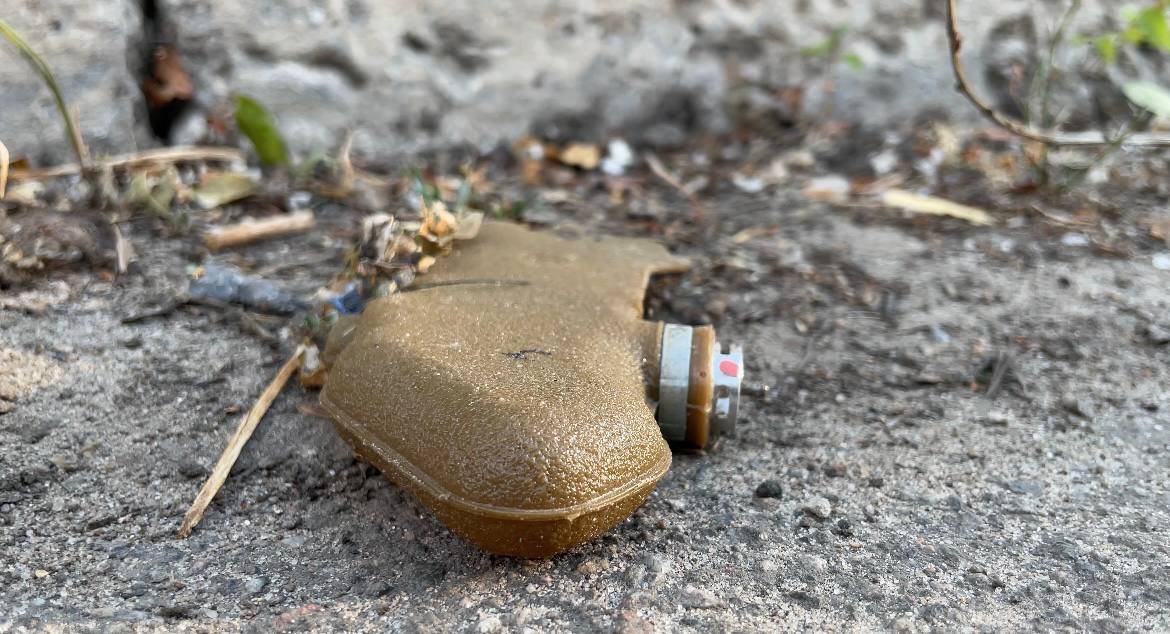

In Makeevka, just east of Donetsk, I went to an orphanage that had been shelled with the mines. Most of the clean-up was completed by the time I arrived on the second day of de-mining, but one remained. I watched a sapper find and detonate it, and although I had previously seen a group of eight mines detonated, creating a massive blast, the force of the single mine was still quite powerful.
According to Dmitry Chamota, Head of Donetsk Emergency Services Deminers, they found 26 PFM-1 mines scattered around the grounds of the orphanage, including on the playground.
In June, I met Andrey Levchenko, Chief of Kievskiy District Emergency Ministry. Over the course of the two hours at his station, Ukraine was intensively shelling the district, leading us to take cover inside the building lest the property be targeted again.
We did venture outside between bouts of shelling, where Levchenko pointed out damage to the buildings and the shell of the Ukrainian-fired Hurricane MLRS which struck the premises.
The building has blown out windows, sandbagged windows to attempt to protect the workers; some days prior, the chief’s office had been damaged by shrapnel from the shelling. Thankfully, he had just stepped out a minute before the blast.
He showed me the fire truck damaged on June 22, pointing out the many shrapnel holes and noting one of the rear tires had been blown out.
Two of the employees who had been out on that call spoke to me about that day, saying that, after Ukrainian shelling of the district, they received a call that people were trapped inside a building with the door blocked after the shelling. A fire was spreading to the second and third floors, and that people were unable to escape. As the rescuers assessed the situation, a shell hit a wall near the truck and wounded the driver.
They said that, prior to the shelling, they saw a drone overhead. This, combined with the facts that they were uniformed and the fire truck was clearly marked and in a civilian area where people were calling for help, makes it credible to believe Ukraine deliberately targeted the rescuers.
Of Ukraine’s heightened shelling over the past many months, Levchenko said it was constant and daily. “Before, if we speak about 2014-2015, twenty minutes, one hour maximum. Now six-seven hours non-stop, every day.”
He said that the Ukrainian forces shell, wait until rescuers arrive and then shell again. “They wait for 30 minutes for us to arrive. We arrive there, start assisting people, and the shelling resumes.”
This is something I witnessed for myself when, on August 4, Ukraine bombed the hotel in which I was staying, the fourth and fifth shells landing 50 meters away and then directly beside the hotel, respectively. When the fifth struck, shattering inwards the lobby glass doors, I had fortunately just stepped out of the lobby where 30 seconds earlier I had been speaking to journalists who had run in from the street.

When it seemed the shelling had stopped, journalists went outside to document the damage. Sadly, a young woman outside the hotel had been killed by the shelling. Five others just two streets away were also torn apart by the bombs, including a promising 12-year-old ballerina, her grandmother, and her world famous former ballerina ballet teacher.

Emergency Services arrived and, not long after, Ukraine resumed its shelling. Fortunately, they were able to get inside, but this is just one example of Ukraine’s double strikes.
According to Levchenko, Ukraine does not only shell two times, but that they sometimes shell three times: “They wait again, our guys hide in the shelters, as soon as we go out, put out the fire, help people, there could be people under the debris, doors stuck, people can’t get out and get to the basement…then shelling resumes.”
He described the people engaging in this sort of warfare against civilians and rescuers as “Shameless. Scumbags. Terrorists.”
He is not wrong.
Targeting Rescuers: A Terrorist Tactic Adopted by U.S. Allies in Ukraine, Israel and Syria
As the DPR Emergency Services chief pointed out damage to the fire truck, I was reminded of Israel’s attacks on Palestinian medics and fire brigades in Gaza, including during the December 27, 2008-January 18, 2009, Israeli war on Gaza, where I was living at the time.
During those three weeks, I rode in the medics’ ambulances, documenting the destruction and the victims of Israel’s war crimes, but also in a sense as a human shield, in the hope that Israel would not strike ambulances in which a handful of internationals and I were riding.
As it turned out, by the end of the Israeli massacre of Gaza, Israeli forces killed 16 medical rescuers, four in one day alone. Another 57 were injured. At least 16 ambulances were damaged, with at least nine completely destroyed.
One of the murdered was a 35-year-old paramedic, Arafa Abd al-Dayem, who I had accompanied the night prior to his murder. As I wrote of that evening, “The dead, a 24-year-old night watchman, had no warning of the at least 2 missiles which leveled the school and tore him apart. The medics work to load the corpse, first having to replace the flat tire. Working frantically, still fearful of potential strikes, they crowd the ambulance, hoist the van, replace the flat. A missile hits 50 meters away. Surely, undoubtedly, those warplanes above us know—from the markings of the ambulance, the clothes of the medics, the crystal clear photos their drones can take—that we are civilians and medics below. Yet they fire.”
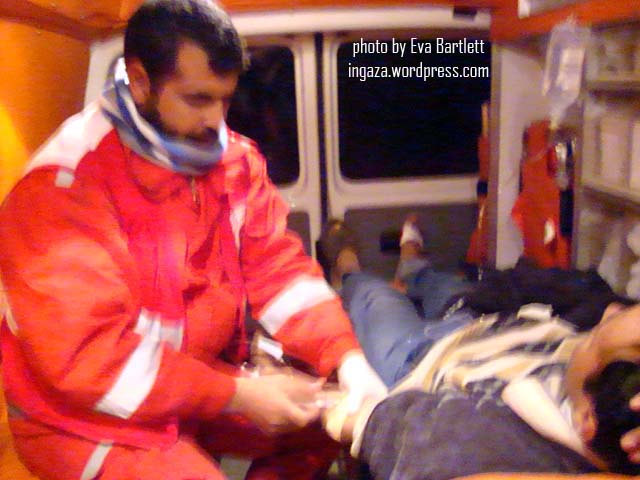
Arafa was killed later that day, when Israeli forces fired a flechette shell directly at his ambulance, shredding him with the dart-like flechettes, causing massive internal bleeding in his abdomen, blood in his lung, shock, and death.
A surgeon I interviewed later when writing about Israel’s widespread use of flechettes in Gaza told me that flechettes cause more injuries than other small munitions precisely because they spread in a larger area. And while the darts appear innocuously small, their velocity and design enable them to bore through cement and bones and “cut everything internal.” Accordingly, the prime cause of death is severe internal bleeding from slashed organs, particularly the heart, liver and brain.
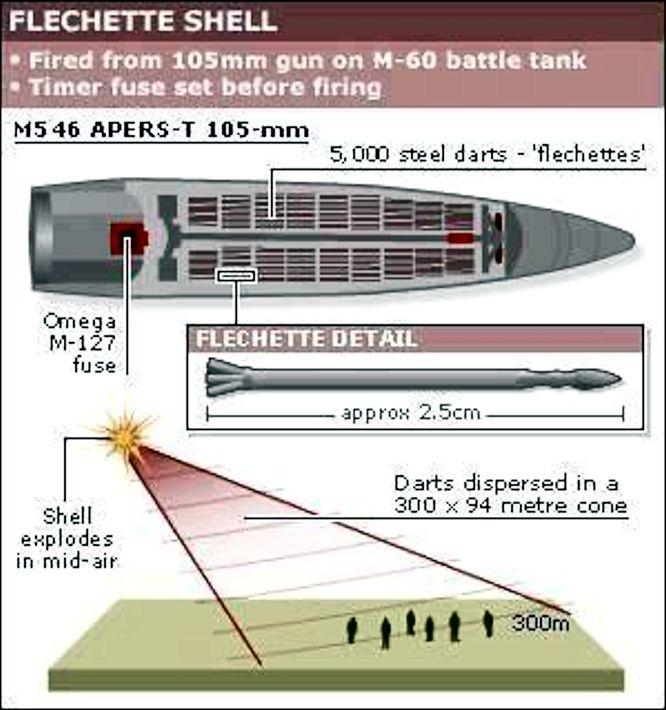
One of the injured, Hassan al-Attal, 35, was a medic whose ambulance I was in when he and another medic came under Israeli sniper fire while attempting to retrieve a corpse from the street just beyond the ambulance. The sniper fire reached the ambulance itself. Hassan was wounded in the leg. This was during a few hours of supposed cease-fire. But in any case, the medics never should have been targeted.
As I wrote, “Although the Geneva Conventions explicitly state that ‘medical personnel searching, collecting, transporting or treating the wounded should be protected and respected in all circumstances,’ throughout Israel’s invasion this was not the case. Indeed, as the injured and emergency workers testify, Israeli forces targeted and prevented medical workers from reaching the wounded.
Without coordination, many ambulances did not dare risk Israeli gunfire and shelling, meaning hundreds of calls went unanswered, according to the Palestinian Center for Human Rights. Denied medical care, many victims succumbed to their wounds.”
Israeli forces killed 13 Civil Defense workers and injured 31, also destroyed six civil defense stations and damaging four.
From that same article, “Civil Defense workers, like medics, are protected under international law. The Fourth Geneva Convention states not only that emergency workers must be respected and allowed to do their work, but that their buildings, equipment and vehicles must not be targeted.
Yousef al-Zahar, director-general of Civil Defense in Gaza, told me at the time, ‘Targeting the Civil Defense centers and teams is an obvious indicator that the Israeli forces intended to paralyze Civil Defense activities in the Gaza Strip to raise civilian victims’ numbers in the casualties.’”
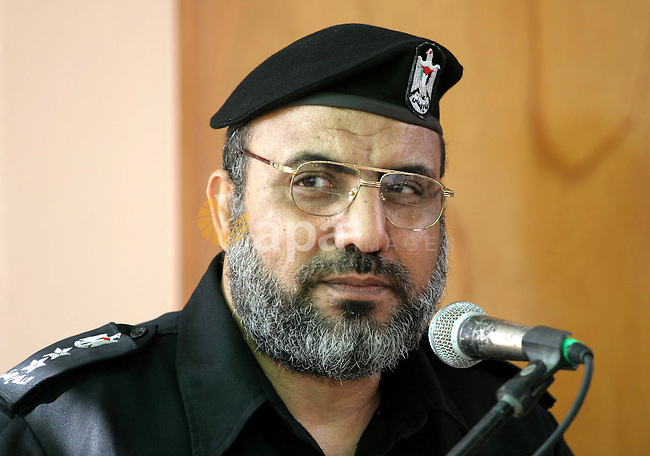
According to statistics from the Palestinian Authority Ministry of Health and the PRCS, from the outbreak of the second Intifada in September 2000 to when I wrote the 2010 article, Israeli Forces have killed at least 56 medical rescuers, including paramedics, drivers, doctors and volunteers—an average of one rescuer every two months—and have injured at least another 500 medical rescuers.
Likewise, British journalist Vanessa Beeley has written at length about Syrian rescuers targeted by terrorist factions in Syria, their equipment stolen. In one of her articles, she cited a Commanding Officer of the Real Syria Civil Defense in an Aleppo district describing a scenario which Donbas and Palestinian rescuers would recognize:
“They (terrorists) targeted us deliberately in order to destroy our equipment & structures. They wanted to prevent us being able to work for our people. They would target our crew with sniper fire and explosive bullets. Their main mission was to kill the crew and destroy our base so we couldn’t care for the people of Aleppo.”
In that same article, she noted that “terrorist groups systematically carried out double-tap attacks” on the rescuers, just as Israel does to Palestinian rescuers and Ukraine to Donbas rescuers.
Ukraine Continues Killing Donbas Rescuers
On September 1, 13 DPR Emergency workers were killed and 9 injured from Ukrainian shelling. According to a representative of the Emergency Situations, the shelling was intentional.
“The missiles exactly hit residential buildings. The vehicle was outside and it was hit with shrapnel and pieces of the destroyed building. But again, you can see it’s an emergency vehicle—a fire vehicle. This is a war crime.”
The following day, two more Emergency Services workers were killed and two injured by Ukrainian shelling of their fire truck, in Makeevka. They were en route to put out a fire. Images accompanying the news show a mangled bright red fire truck, unmistakably a rescue services vehicle.
When in August I spoke with the Director of the Donetsk Department of Fire and Rescue of the Ministry of Emergency Situations, he told me that, at that time, four Emergency Services workers had been killed and 40 injured by Ukrainian shelling.
With Ukraine’s targeting of Emergency Services in September, the number of rescuers Ukraine has killed is now at least 19, with another 51 injured.

I had the chance to speak with the mother of a young firefighter, Pavel (“Pasha”) Legonkiy, killed by Ukrainian shelling on June 18, 2022. He and other Emergency Services personnel had gone to the site of a Ukrainian shelling, in central Donetsk. A Ukrainian double-tap strike killed Pasha and the driver, injuring three others.
Svetlana spoke proudly of her courageous, compassionate son.
“He loved his work very much. He lived for this work. It was his duty to help people. My son dreamed of starting a family, dreamed of having children, dreamed of working! And one shell that you sent here ended his life.”
These men and women know very well the threats they face when going out on a call, but go anyway, to help their citizens under Ukrainian attacks.
The two women I spoke to at Donetsk Ambulance Services replied to my question about whether they considered stopping their work.
“I’m really scared, everyone is scared. But what can we do? How about the patients? They are people like me, they hurt and are even more scared. They are waiting for our help. While you are driving you feel fear, but as soon as you get to the place of the tragedy, the fear goes away and you just start doing your job and forget about this fear.”
The Kievskiy Emergency Ministry Chief, Andrey Levchenko, said of the rescuers, “They are all heroes. If it were possible, I would give a medal to every one of them, to honor their work, to support them. But they don’t do that for the medals, no way. Nobody ever said, ‘we’re not going, we don’t want to,’” he said, referring to when rescuers go out on calls.
He is right. These rescuers are heroes, putting their lives on the line every time they go out to help a person in need, knowing full well Ukraine frequently strikes an area a second and a third time, specifically to target rescuers. While they might not receive or want medals, they should be afforded their right under international law to rescue people without fear of being shelled by Ukraine.

CovertAction Magazine is made possible by subscriptions, orders and donations from readers like you.
Blow the Whistle on U.S. Imperialism
Click the whistle and donate
When you donate to CovertAction Magazine, you are supporting investigative journalism. Your contributions go directly to supporting the development, production, editing, and dissemination of the Magazine.
CovertAction Magazine does not receive corporate or government sponsorship. Yet, we hold a steadfast commitment to providing compensation for writers, editorial and technical support. Your support helps facilitate this compensation as well as increase the caliber of this work.
Please make a donation by clicking on the donate logo above and enter the amount and your credit or debit card information.
CovertAction Institute, Inc. (CAI) is a 501(c)(3) non-profit organization and your gift is tax-deductible for federal income purposes. CAI’s tax-exempt ID number is 87-2461683.
We sincerely thank you for your support.
Disclaimer: The contents of this article are the sole responsibility of the author(s). CovertAction Institute, Inc. (CAI), including its Board of Directors (BD), Editorial Board (EB), Advisory Board (AB), staff, volunteers and its projects (including CovertAction Magazine) are not responsible for any inaccurate or incorrect statement in this article. This article also does not necessarily represent the views the BD, the EB, the AB, staff, volunteers, or any members of its projects.
Differing viewpoints: CAM publishes articles with differing viewpoints in an effort to nurture vibrant debate and thoughtful critical analysis. Feel free to comment on the articles in the comment section and/or send your letters to the Editors, which we will publish in the Letters column.
Copyrighted Material: This web site may contain copyrighted material the use of which has not always been specifically authorized by the copyright owner. As a not-for-profit charitable organization incorporated in the State of New York, we are making such material available in an effort to advance the understanding of humanity’s problems and hopefully to help find solutions for those problems. We believe this constitutes a ‘fair use’ of any such copyrighted material as provided for in section 107 of the US Copyright Law. You can read more about ‘fair use’ and US Copyright Law at the Legal Information Institute of Cornell Law School.
Republishing: CovertAction Magazine (CAM) grants permission to cross-post CAM articles on not-for-profit community internet sites as long as the source is acknowledged together with a hyperlink to the original CovertAction Magazine article. Also, kindly let us know at info@CovertActionMagazine.com. For publication of CAM articles in print or other forms including commercial internet sites, contact: info@CovertActionMagazine.com.
By using this site, you agree to these terms above.
About the Author

Eva Karene Bartlett is a Canadian-American journalist who has spent years on the ground covering conflict zones in the Middle East, especially in Syria and Palestine (where she lived for nearly four years).
She was a recipient of the 2017 International Journalism Award for International Reporting, granted by the Mexican Journalists’ Press Club (founded in 1951), and was the first recipient of the Serena Shim Award for Uncompromised Integrity in Journalism.
See her extended bio on her blog In Gaza. She tweets from @EvaKBartlett and has the Telegram Channel, Reality Theories.
Eva can also be reached at evakbartlett2017@gmail.com.

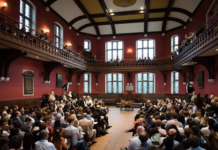




[…] and triple striking the same areas is another method used by Ukrainian forces. In an interview last year, the director of the Department of Fire and Rescue Forces of the DPR Ministry of Emergency […]
[…] –Ukrainian Army War Crimes Include Shelling of Ambulences, Firetrucks, and Rescue Workers in the Donb… […]
[…] and triple striking the same areas is another method used by Ukrainian forces. In an interview last year, the director of the Department of Fire and Rescue Forces of the DPR Ministry of Emergency […]
[…] September 23, 2022, Covert Action Magazine […]
[…] Source […]
[…] September 23, 2022, Covert Action Magazine […]
[…] September 23, 2022, Covert Action Magazine […]
[…] Allegedly Expose Ukrainian Military as responsible For Killing of Civilians at Bucha” and “Ukrainian Army War Crimes Include Shelling of Ambulences, Firetrucks, and Rescue Workers in t… and “Ukrainian Nationalists Have Long History of Anti-Semitism which the Soviet Union Tried […]
[…] Ukrainian Army War Crimes Include Shelling of Ambulences, Firetrucks, and Rescue Workers in the Donb… […]
[…] Ukrainian Army War Crimes Include Shelling of Ambulences, Firetrucks, and Rescue Workers in the Donb… […]
https://en.wikipedia.org/wiki/Eva_Bartlett
Not only habitual war crimes, but their behaviors can be summarized or concluded as the complete components by universal definition for “terrorism” by the pro-western Kiev regime, and so the US Empire and its colonies and vassals then are legally fall under the actors or supporters of terrorism too. The generalized open-end US GWOT will be the precedent for the specific terrorist regime in Kiev. The 2 key components of terrorism is violence and political purposes to force the other government to follow the intentions of terrorists. Your journalism is the collection of these serious war crimes that also are acts of terror.
[…] Eva Bartlett Global Research, September 25, 2022 CovertAction Magazine 23 September 2022 Region: Europe, Russia and FSU Theme: Intelligence, Law and Justice, Media […]
[…] 9-23-2022: Ukrainian Army War Crimes Include Shelling of Ambulences, Firetrucks, and Rescue Workers in the Donb… […]
[…] CovertAction Magazine 23 September 2022 […]
[…] https://covertactionmagazine.com/2022/09/23/ukrainian-army-war-crimes-include-shelling-of-ambulences… […]